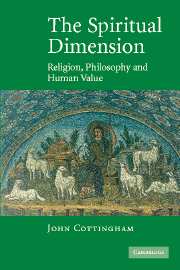Book contents
- Frontmatter
- Contents
- Preface and acknowledgements
- 1 Religion and spirituality: from praxis to belief
- 2 Religion and science: theodicy in an imperfect universe
- 3 Religion and value: the problem of heteronomy
- 4 Religion and self-discovery: the interior journey
- 5 Religion and language: emotion, symbol, and fact
- 6 Religion and the Enlightenment: modernist and postmodernist obstacles
- 7 Religion and the good life: the epistemic and moral resources of spirituality
- 8 Religion and pluralism: which spirituality?
- Bibliography
- Index
7 - Religion and the good life: the epistemic and moral resources of spirituality
Published online by Cambridge University Press: 24 November 2009
- Frontmatter
- Contents
- Preface and acknowledgements
- 1 Religion and spirituality: from praxis to belief
- 2 Religion and science: theodicy in an imperfect universe
- 3 Religion and value: the problem of heteronomy
- 4 Religion and self-discovery: the interior journey
- 5 Religion and language: emotion, symbol, and fact
- 6 Religion and the Enlightenment: modernist and postmodernist obstacles
- 7 Religion and the good life: the epistemic and moral resources of spirituality
- 8 Religion and pluralism: which spirituality?
- Bibliography
- Index
Summary
Thou art not yit at Jerusalem, but bi smale sodeyn lightnynges that gliteren oute thorugh smale cranés fro the cité schalt thou mowen see it from feer, or thou come therto. (‘Thou art not yet at Jerusalem. But by small sudden lightnings that glide out through small crannies from that city, thou shalt be able to see it from afar, before thou come thereto.’)
Walter Hilton.Naturae nostrae infirmitas est agnoscenda.
(‘We must acknowledge the weakness of our nature’.)
René Descartes.WHAT IT MEANS TO BELIEVE
Suppose, as suggested at the end of the last chapter, that one has reached a position of faith in a conscious creative power, independent of the phenomenal universe, a power that stands over against the universe as fundamentally ‘other’, yet which fills something like the role envisaged in traditional theological metaphysics – the uncaused cause of the cosmos and all its energy, the necessary foundation for the entire series of contingent events studied by science, the perfect source of all value, and the ultimate good towards which all things strive. What would it mean to believe in such a being, the being of which Aquinas said et hoc dicimus Deum, ‘and this we call God’?
This rather vague question can, I think, be broken down into three sub-questions. One way of inquiring into what it means to be a believer involves asking about the conditions for forming such a belief and the context in which theistic commitment operates.
- Type
- Chapter
- Information
- The Spiritual DimensionReligion, Philosophy and Human Value, pp. 127 - 149Publisher: Cambridge University PressPrint publication year: 2005



